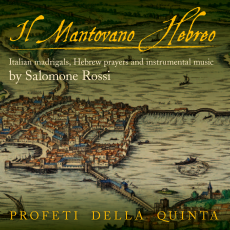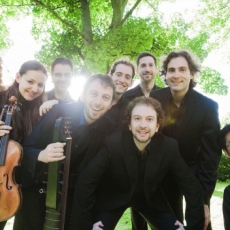Profeti della Quinta - Salomone Rossi: Il Mantovano Hebreo - Examiner.com
At the end of the sixteenth century, the Gonzaga Court in Mantua was known as a major venue for the composition of original music. In the present day we attribute that reputation primarily to the presence of Claudio Monteverdi. However, Monteverdi had a Jewish colleague named Salomone Rossi who was so highly regarded at the court that he was excused from wearing the yellow badge required of all Jews living in Mantua. (He still had to live in the Jewish ghetto, however.)
On a recent recording released on the Linn label, the eight members of the early music ensemble that calls itself Profeti della Quinta (prophets of the fifth) perform a representative selection of Rossi's compositions. These include selections from his first three books of instrumental music, published between 1607 and 1613, his five books of madrigals (1600-1614), a book of 'madrigaletti' from 1628, and a collection of Psalm settings published between 1622 and 1623. All of these volumes were published in Venice. If this is a representative sample (and there is no reason to believe it is not), then one can appreciate why Rossi was so admired by the Gonzaga Court.
Mind you, his harmonies are not to be as daring as many of those we associate with Monteverdi; but Monteverdi had tended to hold back on some of his more adventurous pursuits until he left Mantua for Venice. While in service to the Gonzagas, his major priority was to remain in service! One is also struck by Rossi's capacity for brevity and how expressive his music could be within such a short duration. The entire recording is a little over an hour long, but it has 30 tracks.
Also, on the basis of my personal experience with the language, I was impressed by the command of Hebrew by the five Profeti della Quinta vocalists. One might think that this would be expected of a group that was founded in Israel, but it is important that they chose pronunciations appropriate to religious services for the Psalm settings, rather than the usual Israeli vernacular. Needless to say, it is unlikely that these pieces were performed at the Gonzaga Court; but they definitely could do with more performances in our more enlightened age!

